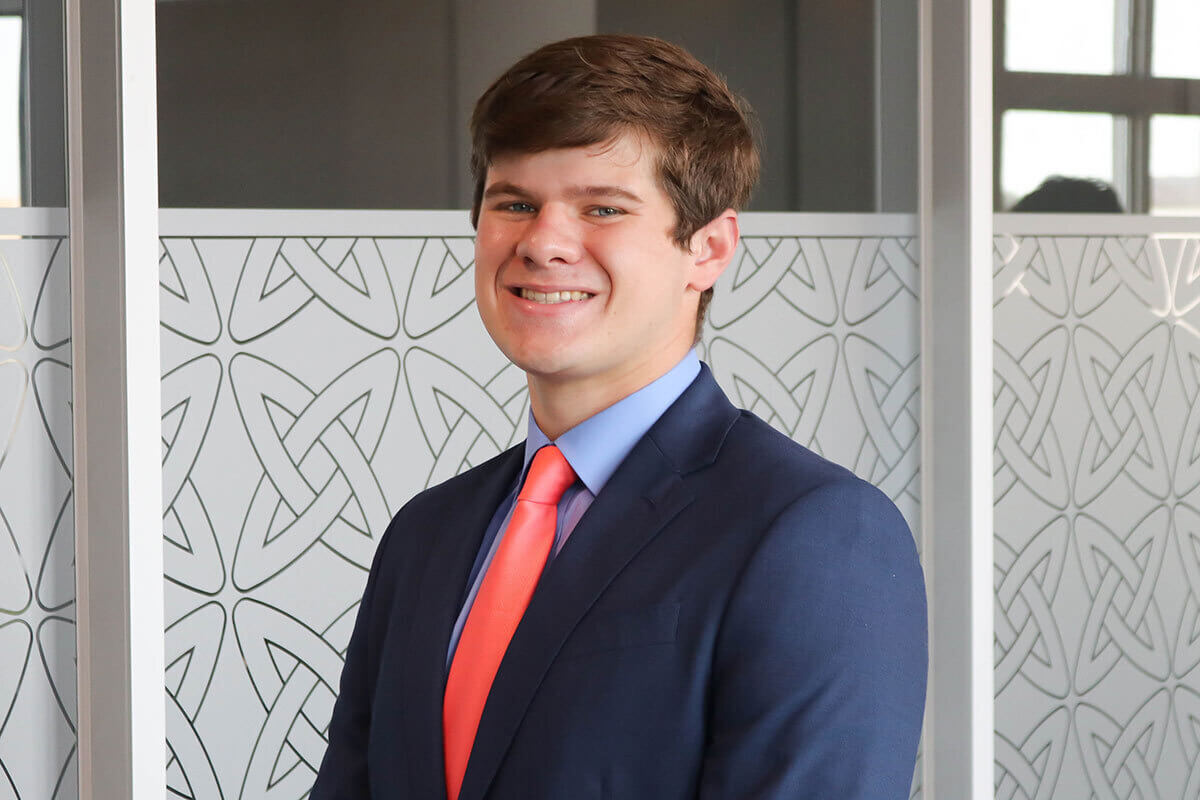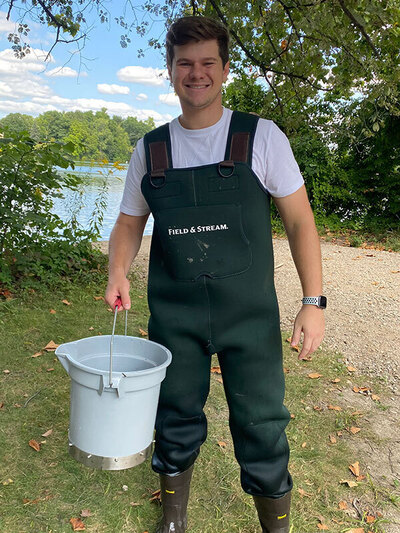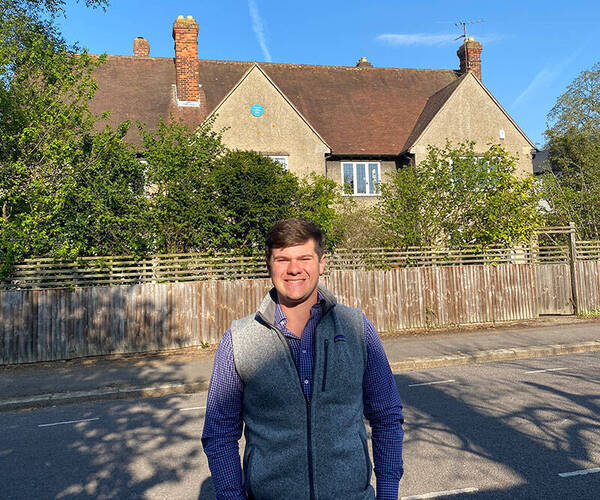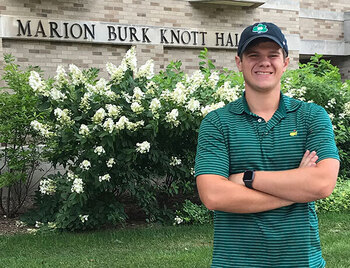
Jack Heatherman started studying English because he wanted to improve his chances of getting into medical school.
It was a decision that ultimately led the senior to a second major, a new career path, an internship that became a job offer, and a passion for writing that inspired him to write a nonfiction travelog and a coming-of-age novel for his senior thesis project.
“I’ve always had the mentality that I don’t want a simple career. I want to enjoy my work, and create something new and exciting with it,” he said. “Writing gives me that sense of fulfillment and challenge. I write almost every day now, for the sake of the craft and my own sanity. It’s become my passion — and, I really believe, my future.”
Heatherman arrived at Notre Dame as a biology major, and started taking English classes because he heard that medical school applicants who study the liberal arts do better on the analytical portion of the MCAT exam. He had a passion for writing and the arts stemming back to high school, but his initial sole focus was one becoming a doctor.
“Writing gives me that sense of fulfillment and challenge. I write almost every day now, for the sake of the craft and my own sanity. It’s become my passion — and, I really believe, my future.”
As he took more classes and added English as a second major, however, he enjoyed the work enough that his aspirations began to shift.
“Within about a year or two, I started talking with my professors about my growing interest in writing and that argumentative factor within English that I really enjoyed,” he said. “And I said I really want to be in the sciences but I don't think med school is for me. I wanted to be able to use both the skill sets I've learned here at Notre Dame.”
His biology advisor then encouraged him to explore law school opportunities, noting that a niche group of College of Science students go to law school, often involving issues related to medical technology and devices.
“I’m really intrigued by patent law and the potential for being able to help people discover new ideas and control where those ideas go from start to finish,” he said. “Now that’s exciting — that sounds like me.”
A tale of two fields

Balancing two majors in two different colleges at Notre Dame was a challenge, he said, both in terms of scheduling required classes and time management in completing readings, exams, and papers. The bonds he formed with faculty, however, helped him work through it all.
“Something the College of Arts and Letters does very, very well, is being open. Professors have that personal relationship with a student,” he said. “You feel like you have a friend as well as a mentor in your professor, and they’re dedicated to pushing your unique strengths toward success.”
He loves both of his majors, but said he found that after long hours of memorizing terms and working in the lab for science classes, his English coursework often felt like a respite. In wide-ranging classes on topics from international literature to American “weird” culture, he found himself invigorated by the writing and discussion he was involved in.
His majors complement each other well, he said, with biology training his mind to be innovative, while English helps him develop strong communication skills.
“The ability to argue, the ability to speak in public and write and really express your thoughts I think comes directly from Arts and Letters,” Heatherman said. “But that passion and drive towards innovation comes from science. So together, they work very well.”
A formative experience
As a first-year, Heatherman combined his science and writing passions when he began writing for Scientia, the College of Science’s undergraduate journal, then became an editor in his sophomore year.
“The stereotype is that scientists aren’t very good writers, but I think the reality is that good scientists are incredible writers. It’s just a different kind of writing,” he said. “Being an editor was one of the harder things I’ve done at Notre Dame — it made me a better writer, in addition to exposing me to all this research.”

In the spring of his junior year, Heatherman traveled abroad to London, where he grew an affection for the neighborhood he stayed at and even wrote his first book, a nonfiction “love project toward my time abroad,” which he is now talking with publishers about releasing.
Heatherman is currently working on his creative writing senior thesis project, an epic coming-of-age story about a young South African boy trying to find himself in a place of tremendous cultural intersection. He’s also planning to spend his spring break in Cape Town, South Africa, researching the religion and culture of the Zulu tribe, a trip made possible through a grant from the College of Arts & Letters’ Institute for Scholarship in the Liberal Arts.
Working on his thesis has helped him further grow as a writer, helped develop stronger relationships with faculty in the Department of English, and reconsider what type of writing he might want to do in the future.
“It’s been a very formative experience for me,” he said. “The workshopping, the primary research, the learning about the literary world and the world I’m building in the novel, it becomes more than just a hobby to write.”
A bright future

Heatherman also gained real-world professional experience at Notre Dame through several internships in biotech. He credits the Meruelo Family Center for Career Development for helping him find his most recent one, a summer internship with the Michigan-based medical technology company Stryker. Working in the global regulatory division, he wrote briefs about why certain devices were ready to go to market, and why others weren’t. He also helped them develop a new system for analyzing the market impact of new versus accessory devices.
The feedback he received at the job, Heatherman said, was reflective of the impact of a Notre Dame education.
“People who have been there for 20 years were like, ‘I’ve never met someone who is able to communicate, to bring people together like you,’” he said. “And that was directly correlated to my Notre Dame experience.”
Heatherman credited his classes, workshops, and science labs at Notre Dame as all factoring into his collaboration skills and his high performance, which earned him a return offer to the company for after he graduates from Notre Dame.
“All it took was saying yes to those two majors and letting the rest fall into place,” he said. “I’ll be a writer for life, whether it becomes my full-time career or not. I never would have thought that possible before. At the end of the day, I feel better prepared for my job and, eventually, law school thanks to my time studying English.”
“I’ll be a writer for life, whether it becomes my full-time career or not. I never would have thought that possible before. At the end of the day, I feel better prepared for my job and, eventually, law school thanks to my time studying English.”
Originally published by at al.nd.edu on February 16, 2023.